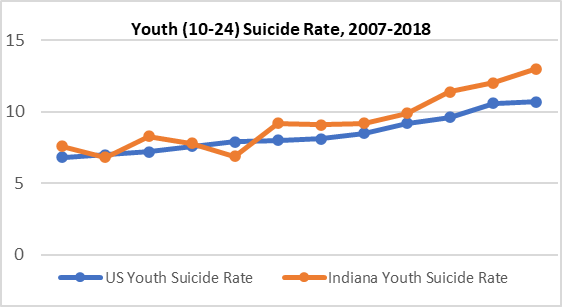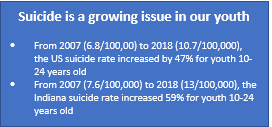North Central Health Services Awards Preventing Youth Suicide Grants to 19 School Corporations
In 2021, NCHS announced a grant opportunity for K-12 school corporations serving Benton, Carroll, Clinton, Fountain, Montgomery, Tippecanoe, Warren, and White counties in Indiana, the Preventing Youth Suicide Initiative. NCHS has allocated over $1.1 million to support 12 school corporations in North Central Indiana. The grants will support schools in six counties launching evidence-based youth suicide prevention. This initiative will serve an anticipated 35,000 students by the 2024 school year. Building on this success, in 2024, NCHS extended this initiative to new school districts. Seven districts are set to implement the program, reaching around 10,350 students by the close of the 2026 school year.

Background
North Central Health Services (NCHS) is committed to providing health care and promoting healthy communities to benefit the citizens of Benton, Carroll, Clinton, Fountain, Montgomery, Tippecanoe, Warren, and White counties. Since 1999, NCHS has awarded over $82 million in grant funding through over 650 grants to more than 225 different organizations in the NCHS service area. Beyond its Community Benefit Capital Grant program, NCHS also initiates strategic partnerships with coalitions, funders, nonprofits, and other entities to address the most critical community health needs identified by the NCHS and River Bend Hospital Community Health Needs Assessment. These NCHS-initiated Community Benefit Partnerships fund the launch, expansion, or strengthening of programs and services that improve health outcomes and develop healthy communities.
 Why suicide prevention?
Why suicide prevention?
Risk in youth ages 10-24 has increased significantly in the past 15 years. In the wake of the COVID-19 pandemic, there is further evidence of increasing levels of distress and suicidality among adolescents, including a rise in ED visits for suicide attempts among girls aged 12-17 (an increase of over 50% over 2019 levels).
Nearly one-third of Indiana high school students reported feeling sad or hopeless in the past year, one in five students seriously considered attempting suicide, and one in ten students attempted and survived suicide. (IUPUI Center For Health Policy, 20) In Indiana, suicide is the 3rd leading cause of death for ages 10-24 and 2nd leading for ages 25-34, according to the American Foundation for Suicide Prevention. Several factors may increase a young person’s risk for suicide, including mental health disorders and substance use, prior suicide attempts, challenges in executive functioning, access to lethal means, and adverse childhood experiences, including family conflict and violence. Protective factors that can buffer against these risks include life skills; positive connections to peers, trusted adults, and school systems; and family and school engagement.

What does research tell us about how schools can work to prevent suicide?
- While every suicide cannot be stopped, suicide is preventable
- All school community members can learn the warning signs of suicide and take actions to support at-risk youth
- School systems/protocols can guide the school community in responding to suicide risk & deaths by suicide
- Implementing a variety of prevention strategies (a comprehensive approach to suicide prevention) has been shown to reduce youth suicide rates
- Schools can invest in the social-emotional wellbeing of youth and create environments that reduce risk factors and increase protective factors
What is the Preventing Youth Suicide Initiative?
As a funder that prioritizes grant impact in mental health improvement and substance abuse, NCHS seeks to assist schools in developing youth resiliency through social-emotional competency, drug resistance, and mental well-being. The Preventing Youth Suicide Initiative is a two-year grant for planning, implementing, and sustaining prevention efforts in schools and districts.
NCHS is partnering with the Education Development Center (EDC) to provide an opportunity for school and district teams to focus on integrating mental health within the tiers of the education system to ensure that school communities are part of an effort to address and enhance suicide prevention school-wide, building on a strong foundation of social-emotional learning and life skills. NCHS and EDC had multiple requests from our Resilient Youth Initiative Schools for assistance with suicide prevention planning.
EDC is focused on integrating mental health within the tiers of the education system to ensure that school communities are part of an effort to address and enhance suicide prevention school-wide, building on a solid foundation of social-emotional learning and life skills.
This initiative is a 2-year structure (May 2022 – June 2024) for planning, implementing, and sustaining prevention efforts in schools and districts. Aspects of continuous improvements, such as identifying progress measures, and collecting and applying those data, will be embedded in each phase. This initiative includes virtual consultation, support, and in-person site visits for more intensive coaching and assistance.
The multi-tiered approach will include six key components:
- Written protocols for helping students at risk of suicide
- Written protocols for a response after a suicide
- Developing community partnerships to ensure students receive necessary support and services
- Identification of youth at risk for suicide
- Promoting protective factors that enhance students’ wellbeing
- Engaging key stakeholders, including parents and school leadership, in suicide prevention messaging, planning, and training
Preventing Youth Suicide Initiative Grant Recipients
In 2021, twelve grants in six counties were awarded totaling $1.1 million in direct funding. The following grantees will receive coaching from field experts, custom training and support, and community of practice opportunities.
- Attica Consolidated School Corporation
- Benton Community School Corporation
- Clinton Central School Corporation
- Clinton Prairie School Corporation
- Community Schools of Frankfort
- Frankfort Crossing School of Business & Entrepreneurship
- Lafayette Catholic School System
- Lafayette School Corporation
- MSD of Warren County
- Rossville Consolidated School District
- Tippecanoe School Corporation
- Twin Lakes School Corporation
In 2024, the initiative will extend to the following districts, with the aim of impacting 25 schools and reaching approximately 10,350 students by the 2026 school year:
- Covington Community School Corporation
- Crawfordsville Community School Corporation
- North White School Corporation
- South Montgomery Community School Corporation
- Southeast Fountain School Corporation
- Tri-County School Corporation
- West Lafayette Community School Corporation
Grantee Resources
As part of the Preventing Youth Suicide Initiative, NCHS and EDC are providing the following community and learning resources:
Grant Resources:
- Preventing Youth Suicide Initiative Summer Reading List
- Year 2 Preventing Youth Suicide Summer Reading List
- Overview of 6 Suicide Prevention Components
- Preventing Youth Suicide Initiative (PYSI) Multi-Tiered School Suicide Prevention Recommended Suicide Prevention Professional Development, Trainings, and Programs
- North Central Indiana Mental Health and Crisis Resource List
Grant Opportunities:
Implementing Teen Cafes: The purpose of this funding opportunity from IU Health and NCHS is to increase our communities’ capacities to lead transformative conversations that will help heal and improve family and community relationships through the implementation of #WoWTalk (Words of Wisdom) Cafés (referred to as “Teen Cafés” in this funding announcement) through Be Strong Families. Supported organizations will receive the required 2-day training to facilitate Teen Cafés in their communities along with funding to host a specified number of Cafés each year.
Application Deadline: November 4, 2022 | Award Notification: November 18, 2022
For more information and to complete the application click: Teen Cafe' Funding Application
Understanding Mental Wellness: Understanding Mental Wellness is a self-guided, digital course that introduces students to the topic of mental health and how they can implement coping strategies to manage their own challenging thoughts, emotions, and behaviors. Students will learn how to support friends and family who may be struggling, recognize when to seek help, and access appropriate resources to do so. This is a complimentary program offered to NCHS schools located in Benton, Carroll, Clinton, Fountain, Montgomery, Tippecanoe, Warren, or White counties.
Grade Level: 8th-10th
Total Lessons: 5 lessons, 10-15 mins each
Standards Alignment: Indiana Health Standards
Subject Alignment: Advisory, Homeroom,Health/PE, Response to Intervention
Languages: English, Spanish
Contact Ryan Trauger - [email protected] to get more information.
Contact
Please direct questions about the initiative to Michelle Kreinbrook, Director of Community Benefit and Outreach at [email protected] or 765-423-1604.
References
Miller, D. N. (2021). Child and adolescent suicidal behavior: School-based prevention, assessment, and intervention. Guilford Publications.
Yard, E., Radhakrishnan, L., Ballesteros, M.F., Sheppard, M., Gates, A., Stein, Z. Hartnett, K., Kite-Powell, A., Rodgers, L., Adjemian, J., Ehlman, D.C., Holland, K., Idaikkadar, N., Ivey-Stephenson, A., Martinez, P., Law, R., Stone, D.M. (2021). Emergency Department Visits for Suspected Suicide Attempts Among Persons Aged 12-25 Years Before and During the COVID-19 Pandemic – United States, January 2019-May 2021. Morbidity and Mortality Weekly Report, 70(24): 888-894. doi: 10.15585/mmwr.mm7024e1
Bilsen, J. (2018). Suicide and Youth: Risk Factors. Front Psychiatry, 9:540. https://doi.org/10.3389/fpsyt.2018.00540
Janiri, D., Doucet, G.E., Pompili, M., Sani, G., Luna, B., Brent, D.A., Frangou, S. (2020). Lancet Psychiatry, 7(4): 317-326. https://dx.doi.org/10.1016%2FS2215-0366(20)30049-3
Godoy Garraza, L., Kuiper, N., Goldston, D., McKeon, R., & Walrath, C. (2019). Long-term impact of the Garrett Lee Smith Youth Suicide Prevention Program on youth suicide mortality, 2006-2015. Journal of child psychology and psychiatry, and allied disciplines, 60(10), 1142–1147. https://doi.org/10.1111/jcpp.13058
Singer, J.B., Erbacher, T.A. & Rosen, P. School-Based Suicide Prevention: A Framework for Evidence-Based Practice. School Mental Health 11, 54–71 (2019). https://doi.org/10.1007/s12310-018-9245-8
Substance Abuse and Mental Health Services Administration. Preventing Suicide: A Toolkit for High Schools. HHS Publication No. SMA-12-4669. Rockville, MD: Center for Mental Health Services, Substance Abuse and Mental Health Services Administration, 2012. https://store.samhsa.gov/product/Preventing-Suicide-A-Toolkit-for-High-Schools/SMA12-4669
Juhnke, G. A., Granello, P. F., & Granello, D. H. (2010). Suicide, self-injury, and violence in the schools: Assessment, prevention, and intervention strategies. John Wiley & Sons
 Contact Us
Contact Us